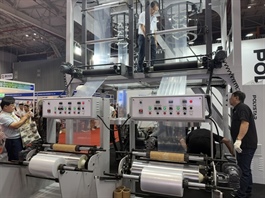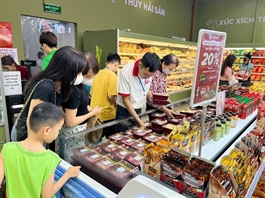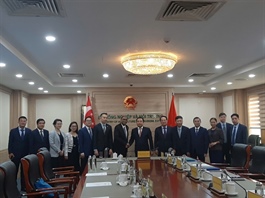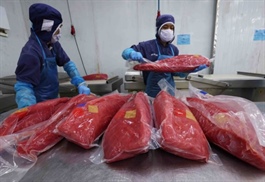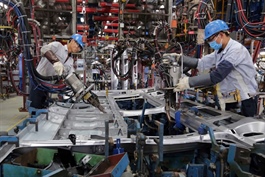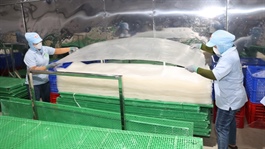Thai Nguyen targets green and sustainable agricultural sector
Thai Nguyen targets green and sustainable agricultural sector
Thai Nguyen province is implementing comprehensive solutions to develop green, smart, and sustainable production zones, thereby enhancing the value of agricultural products and adapting to climate change.
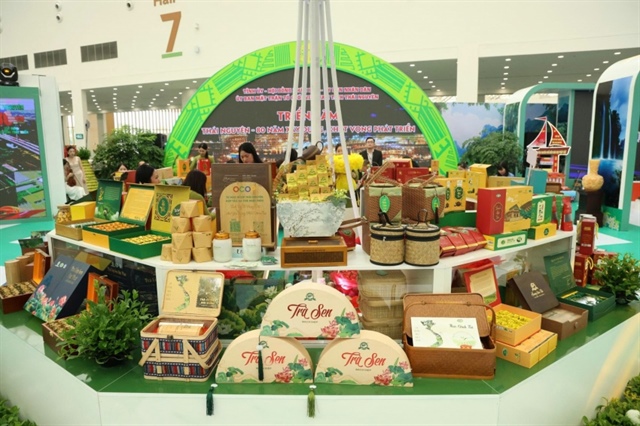
A Thai Nguyen booth at the National Achievements Exhibition commemorating the 80th anniversary of National Day |
With expanded production land following mergers, the northern province of Thai Nguyen has conditions to restructure agriculture towards modernisation and professionalism. This includes key objectives including minimising environmental impacts, enhancing climate change resilience, promoting a circular economy in agriculture, and improving social welfare by creating jobs and sustainable livelihoods.
Thai Nguyen has focused on developing commercial-scale, concentrated green agricultural production zones, such as clean tea regions, organic fruit zones, biological livestock areas, and clean aquaculture zones. These models not only adopt new technologies but also strictly adhere to environmental and food safety standards, particularly by using biological and organic products instead of chemical alternatives.
A significant breakthrough in the agricultural transformation is the enhanced role of enterprises and cooperatives. The province currently has seven cooperative unions with 50 members and a total registered capital of approximately VND40 billion ($1.6 million). These unions have gradually taken on the role of linking production, forming value chains from production to consumption, and providing better support for members.
Enterprises and cooperatives have also led the way in building green value chains, applying technology to environmental protection and producing clean products. As evidence, the province currently has 561 OCOP (One Commune, One Product) items rated three stars or higher, including 438 three-star products, 113 four-star products, and 10 five-star OCOP products.
Agricultural digitalisation
Being considered the “golden key” to sustainable development, digital transformation has had a significant and positive impact on agricultural production. According to the Department of Agriculture and Environment, digitalisation of production processes and the transfer of scientific and technological advancements have been implemented in various forms.
In crop production and plant protection, digital tools have been applied to cultivation processes for fruit trees, tea, rice, and vegetables under VietGAP, organic, and OCOP product standards, along with the management of planting area codes.
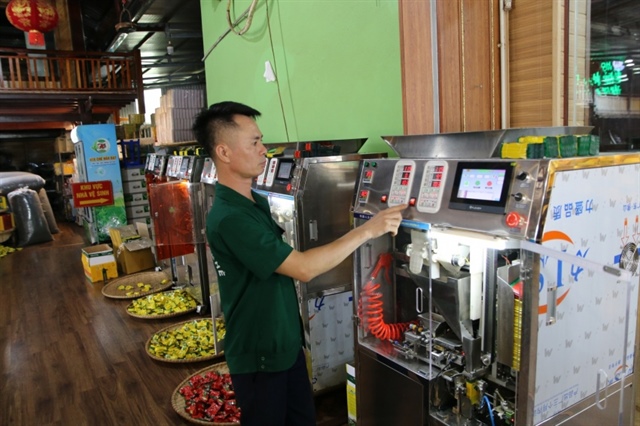
Digital transformation has had a significant and positive impact on agricultural production |
In livestock farming, advanced technologies are applied to high-yield breeds, cold storage barns, automated feeding and watering systems, disinfection, environmental treatment, and the development of value chain linkages.
In forestry, processes for planting trees and medicinal herbs, and guidelines for meeting FSC forest certification requirements are digitalised. In terms of irrigation, a system of disaster warnings and videos alerting to flooding risks at spillways, culverts, and rural roads has been installed with advanced technology. In administrative reform, the department has enhanced the use of IT, ensuring transparency and openness in receiving and processing administrative procedures.
Additionally, the department has developed large-scale data systems, with several applications already in use, such as the Thai Nguyen Agricultural Product Quality Management System, the Planting Area Code Information System, and the Online Disease Information System.
“The application of digital technology in agriculture not only reduces labour and input costs but also enhances quantity, quality, and the value of agricultural products, helping Thai Nguyen’s products position their brands in both domestic and international markets. For instance, through planting area code management, organisations and individuals have paid greater attention to standardising crop care and management processes, monitoring planting areas, issuing pest and disease warnings, planning care schedules, and reporting lists of permitted plant protection products. This solution helps to increase economic value for agricultural products,” said Kieu Quang Khanh, deputy director of the Department of Agriculture and Environment.
“Similarly, promoting digital transformation in product consumption has yielded positive results. Currently, over 160,000 agricultural households in the province have been provided with accounts and have listed more than 2,000 agricultural products on e-commerce platforms. As a result, sales revenue for these entities has increased by 20 to 50 per cent, with online and e-commerce platform sales accounting for 30 per cent of total revenue,” Khanh added.
Developing green agriculture cannot merely be a slogan; it requires a shift in mindset and actions among farmers. A notable change is the growing awareness of environmental protection in agricultural production. Many farmers in Thai Nguyen have proactively transitioned from overusing chemicals to using microbial fertilisers, herbal pesticides, on-site organic composting, utilising agricultural by-products for composting, planting cover crops, and rotating crops to reduce pests and diseases.
Thai Nguyen is also implementing the “One million green, digital, and sustainable farmers by 2030” programme, aimed at training farmers in sustainable production techniques, resource-efficient practices, and technology application. Besides that, the province is enhancing communication, education, and awareness-raising efforts, particularly among the younger generation, while promoting regional collaboration, building green raw material zone brands, and developing ecological agricultural tourism linked to OCOP items.
By 2030, it aims to have 80 per cent of agricultural products meet VietGAP, GlobalGAP, or organic standards; 100 per cent of concentrated production zones digitised and managed with technology; a 30 per cent reduction in chemical pesticides and inorganic fertilisers in cultivation; 100 per cent of agricultural waste reused or treated to meet standards; and 50 per cent of farmers trained in green farming techniques and digitalised production. The province is also committed to strengthening value chain linkages among farmers, cooperatives, and enterprises to stabilise output, build internationally certified agricultural brands, and enhance competitiveness.
The development of a digital agricultural product model opens new opportunities for exports and online consumption. At the same time, the province is focusing on deep processing and product diversification to increase value, reduce reliance on fresh produce sales, and expand markets through a “one product, multiple segments” strategy, targeting demanding markets such as the EU, the US, and Japan.
- 16:35 17/09/2025







